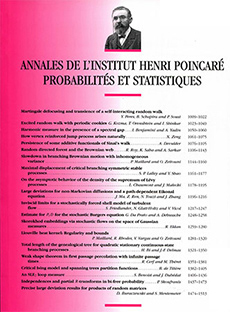Abstract
We study a natural growth process with competition, which was recently introduced to analyze MDLA, a challenging model for the growth of an aggregate by diffusing particles. The growth process consists of two first-passage percolation processes and , spreading with rates 1 and respectively, on a graph G. starts from a single vertex at the origin o, while the initial configuration of consists of infinitely many seeds distributed according to a product of Bernoulli measures of parameter on . starts spreading from time 0, while each seed of only starts spreading after it has been reached by either or . A fundamental question in this model, and in growth processes with competition in general, is whether the two processes coexist (i.e., both produce infinite clusters) with positive probability. We show that this is the case when G is vertex transitive, non-amenable and hyperbolic, in particular, for any there is a such that for all the two processes coexist with positive probability. This is the first non-trivial instance where coexistence is established for this model. We also show that produces an infinite cluster almost surely for any positive λ, μ, establishing fundamental differences with the behavior of such processes on .
Nous étudions un processus de croissance naturel avec compétition, qui a été récemment introduit pour analyser le MDLA, un modèle bien connu et difficile de croissance d’un agrégat par des particules diffusives. Le modèle de croissance considéré est constitué de deux processus de percolation de premier passage et , se propageant à taux 1 et respectivement, sur un graphe G. Le processus débute par un simple sommet à l’origine, alors que la condition initiale de consiste en une infinité de germes distribués selon un produit de lois de Bernoulli de paramètre sur . Le processus débute au temps 0 alors que les germes de ne se propagent qu’après avoir été atteints par ou . Une question fondamentale dans ce modèle, et dans les modèles de croissance en compétition en général, est savoir si les deux processus peuvent coexister (c’est-à-dire que les deux produisent des composantes infinies) avec probabilité strictement positive. Nous montrons que c’est le cas lorsque G est transitif sur les arêtes, non-moyennable et hyperbolique, en particulier, pour tout il existe tel que pour tout les deux processus coexistent avec probabilité strictement positive. C’est la première fois qu’un résultat de coexistence non trivial est établi pour ce modèle. Nous montrons aussi que produit une composante infinie presque surement pour tout λ, μ positifs, montrant des différences fondamentales avec le comportement de tels processus sur .
Acknowledgements
This work started when E. Candellero was affiliated to the University of Warwick. E. Candellero acknowledges support from the project “Programma per Giovani Ricercatori Rita Levi Montalcini” awarded by the Italian Ministry of Education and support by “INdAM – GNAMPA Project 2019”. A. Stauffer acknowledges support from an EPSRC Early Career Fellowship.
Citation
Elisabetta Candellero. Alexandre Stauffer. "Coexistence of competing first passage percolation on hyperbolic graphs." Ann. Inst. H. Poincaré Probab. Statist. 57 (4) 2128 - 2164, November 2021. https://doi.org/10.1214/20-AIHP1134
Information





